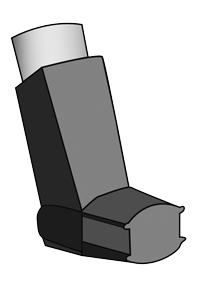Atrovent® HFA
This product is manufactured by Boehringer Ingelheim using the ingredient ipratropium bromide.
This product is taken via MDI (metered dose inhaler).

play
MDI (metered dose inhaler)
Why is it prescribed?
Ipratropium is used to treat bronchospasm in pulmonary diseases (e.g. bronchitis, emphysema, asthma) and to relieve runny nose in chronic rhinitis and the common cold.
- The Atrovent® MDI inhalation aerosol is meant for inhalation only.
- Your doctor or pharmacist should have instructed you on the proper use and care of your Atrovent® MDI. It is advisable to have your technique reassessed by the pharmacist for the first 2 or 3 refills of your prescription.
- Having a lot of mucus in the chest can limit how deep the aerosol reaches into the lung so try to cough before using the Atrovent® MDI, to clear it as much as possible.
- If you experience dry mouth or bad taste after use, rinsing with water or sucking on a candy may help.
- When 2 inhalations are required, wait at least 1 full minute between doses. Each canister contains 200 doses so it is important to keep a record of approximately when it should be replaced. To avoid problems many people keep two inhalers on hand.
- Your inhaler should be stored and used at room temperature. Contents are under pressure. Do not place in hot water or near stoves or other sources of heat. Do not puncture the container. Devices (e.g. spacers, holding chambers) are available to assist you in using your inhaler. Although these devices are not necessary, they have been shown to increase effectiveness and help people who are unable to coordinate inhalation with actuation of the inhaler. Holding chambers can decrease the amount of drug deposited in the mouth and throat, therefore minimizing the risk of related unwanted effects (e.g. hoarseness). Your doctor or pharmacist will help you choose the device most suited to your needs.
- The inhaler should be cleaned and cared for according to manufacturer's instructions.
Alternatives
Other products that have the same ingredient as Atrovent® HFA are •AA-Ipravent inhalation solution •Combivent® Respimat® •Ipratropium/Salbutamol inhalation solution •Ipravent nasal spray •PMS-Ipratropium inhalation solution •PMS-Ipratropium nasal spray •Teva-Combo Sterinebs •Teva-Ipratropium Sterineb •
See other products used in the treatment of •allergic rhinitis •asthma •bronchitis •bronchospasm associated with COPD •chronic bronchitis (COPD) •COPD •emphysema (COPD) •hay fever •perennial rhinitis •rhinitis •runny nose •seasonal rhinitis •
- The usual adult dose is 2 puffs up to 3 or 4 times a day.
- Do not use more than 12 puffs a day unless your doctor told you to do so.
Ipratropium is thought to work by blocking the action of acetylcholine, a chemical messenger involved in the spread of nerve impulses in the body. This "anticholinergic" effect prevents stimulation of certain receptors on bronchial smooth muscle and nasal mucosa. It is a bronchodilator which relieves wheezing and shortness of breath.
Along with its needed effects, ipratropium may cause some unwanted or undesirable effects. Often, ipratropium users who use their medication properly, never experience any unwanted effects. The severity and duration of these effects are dependant on many factors including duration of therapy, dose, route of administration and individual response. Possible unwanted effects include.
- dry mouth or throat
- bad taste
- tremor
Less common:
- shortness of breath
- burning eyes
- eye pain
- palpitations (awareness of heart beat)
- headache
- difficulty urinating
Rare:
- tachycardia (rapid heart rate)
Many of these unwanted effects, especially the most common ones, may disappear with continued use. Consult your doctor immediately if you experience increased wheezing or tightness in the chest, swelling of the tongue or lips, difficulty in swallowing, fast or irregular heartbeat, blurred vision or pain in the eyes, difficult or painful urination, or skin rash.
Accidently getting ipratropium mist in your eyes can temporarily blur vision, worsen glaucoma and cause eye pain. If this happens, immediately flush your eyes with cool tap water for several minutes.
Drug Interactions: Very little ipratropium is absorbed by the body, so it is unlikely that it would interact with any medications taken orally. However, there are always exceptions, so it is important to tell your doctor and pharmacist about any other prescription or over-the-counter medications you are taking.
Use is not recommended in the following situations:
- allergy to ipratropium, atropine or any component of the preparation
- allergy to soya, lecithin or related food products including soybeans and peanuts.
Caution recommended in the following situations:
- glaucoma (narrow angle)
- enlarged prostate
- blockage of the urinary bladder (e.g. difficulty in urination)
Use in pregnancy: Human data suggests low risk. Consult your doctor or pharmacist if you suspect that you may be pregnant.
Use while breastfeeding: Considered safe for use in breastfeeding. Consult your doctor or pharmacist before using.
